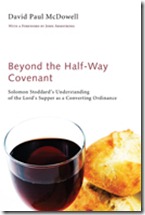“Almost everyone has heard of Jonathan Edwards, but very few are familiar with Solomon Stoddard, Edwards’s grandfather. Stoddard was an influential force in New England Puritanism, often referred to as the "Pope" of the Connecticut Valley of western Massachusetts. He was a powerful preacher who saw five (possibly six) revivals during his fifty-eight-year pastorate in Northampton. Yet, he has often been marginalized because of his very unique view of the Lord’s Supper as a "converting ordinance." In this book, Pastor David McDowell explores Stoddard’s view of Communion as compared to the changing face of Puritanism reflected in the Half-Way Covenant, and in the context of his passionate desire to convert the sinner by any means at his disposal. He believed that God was so gracious and sovereign that no one could judge whether a person was elect or not. Consequently, he crafted an evangelical theology based upon the preaching of the gospel and viewed the Lord’s Supper as another form of preaching for the conversion of sinners.”
I had the privilege of interviewing Pastor David, which is recorded below. Copies of Beyond the Half-Way Covenant can be purchased through Wipf and Stock Publishers online.
1. Why is Solomon Stoddard a significant figure? Stoddard was an influential force in second generation New England Puritanism. He was often referred to as the “pope” of the Connecticut Valley of Western Mass. He was a powerful preacher who saw five (possibly six) revivals during his fifty-eight year pastorate in Northampton. He has often been marginalized because of his controversial view of the Lord’s Supper as a “converting ordinance.” It is this misunderstood view that I have tried to clarify. George Whitfield spoke of the influence of Stoddard’s writings when he visited Edwards in Northampton. John Erskine wrote of Stoddard’s reputation in the foreword to a reprint of Stoddard’s “The Safety of Appearing at the Day of Judgment in the Righteousness of Christ,” a book considered by historians as one of the top books in American intellectual history.
2. What was Stoddard’s greatest contribution to Christian thought? He crafted an evangelical theology based upon the preaching of the gospel and viewed the Lord’s Supper as another form of preaching for the conversion of sinners.
3. How did Solomon Stoddard influence his grandson, Jonathan Edwards? Stoddard was a mentor to Edwards and loomed large as the one who most greatly influenced him in his development as a preacher and in his understanding of spiritual awakening. In fact, Stoddard and Edwards together experienced a local revival during the two years Edwards served as Stoddard’s associate. Stoddard continued to be influential over Edward seven twenty years after Stoddard’s death. Edwards publicly opposed his grandfather’s view of Communion which still held sway in the Northampton church; such a move sealed his doom, and led to his eventual dismissal.
4. What does Stoddard teach today’s pastors and church leaders? Stoddard has usually been viewed as an introduction to Edwards and rarely has he been studied for himself. Stoddard was a magnificent man, a great preacher (more engaging than Edwards), and a true statesmen for revival. A firm believer in election, he also believed that none could determine someone else’s status as such. At a time when most New England churches were thinking how to have a pure visible membership, Stoddard was developing a theology that would cast the gospel net as wide as possible. Stoddard also provides us with a fresh view of the Lord’s Supper which was not innovative, but derived from his study of English Puritanism and Scottish Presbyterianism.





